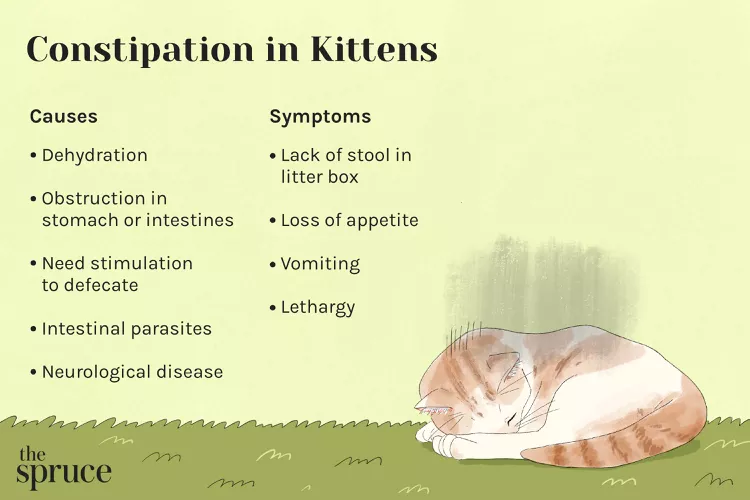Kitten Constipation: What to Do When You Kitten Can't Poop

Kitten constipation may occur for several reasons. Kittens who cannot defecate are not only uncomfortable but are also at risk for serious problems if not treated. If your kitten is litter-trained, you may not even notice constipation until you realize you haven't seen any stool for a few days. Here's how to tell if your kitten is constipated and what to do about it.
Signs and Symptoms of Kitten Constipation
The most common sign of kitten constipation is a lack of stool in the litter box. A constipated kitten may also show the following signs:
- Poor appetite
- Vomiting
- Lethargy
- Straining to defecate
- Producing small, firm balls of stool
- Blood or mucus in stool (or instead of stool)
- Bloated abdomen
- Restlessness
- Vocalization, especially when trying to defecate
- Hiding
Kittens typically defecate at least once daily, but it's not unusual for them to occasionally skip a day. At first, a lack of feces in the litter box may not raise any red flags. But if your kitten has not produced any stool in two or more days, you should start monitoring for constipation (difficulty defecating) or obstipation (not producing any feces).
A constipated kitten may repeatedly visit the litter box, straining to pass stool and even crying out. Kittens may pass small, hard pieces of feces, which may be accompanied by stool-colored liquid, blood, and/or mucus. Pay attention to what you see in the litter box each day so you'll be able to tell if it looks abnormal.
Contact your veterinarian if you think your kitten may be constipated or if they're showing any signs of illness.
What Causes Kitten Constipation?
Kitten constipation may have several contributing causes.
Dehydration
Dehydration is a common cause of constipation in animals. This usually happens if a kitten does not have access to a water bowl and it only eats dry food, or during the weaning process when it's transitioning off of its mother's milk. The stools that it passes—if any are produced at all—will be small and very hard.
Gastrointestinal Obstruction
Kittens may eat non-food items that can block the stomachs or intestines, making them unable to defecate. This is common with curious kittens that eat things like strings, ribbons, floss, hair ties, and other household items that are small enough to fit in their mouths. The item may prevent food from passing or bind up the intestines so that the GI tract is unable to move things through the kitten's body. Hairballs can also cause a kitten to be unable to defecate.
Intestinal Parasites
Heavy intestinal parasite burdens can cause a kitten to become constipated. The worms may become so numerous in the intestines that they cause a blockage, keeping stool from passing.
Age
Very young kittens that are not yet weaned need to be stimulated to defecate. Mother cats usually do this by licking the rectum of their kittens. If the mother cat fails to do this, a kitten is likely to get constipated unless a human is regularly wiping the kitten's rectum to stimulate it to pass stool. Young kittens may also become constipated when they are weaned and transitioned to solid food.
Other Diseases
A kitten can be born with a birth defect or condition that prevents normal defecation. Neurological conditions and various other diseases may cause a kitten to be constipated or obstipated, but these are more common in older cats,
How Do Vets Diagnose Kitten Constipation?
Your veterinarian will begin by discussing your kitten's history and performing a physical examination, which includes feeling the abdomen for impacted stool. The vet may recommend X-rays of the abdomen to visualize the intestines and definitively diagnose constipation or obstipation.
How to Treat Kitten Constipation
If your kitten's constipation has just begun and they're still eating, playing, and acting normally, you can try a few things before seeking veterinary assistance.
- Increase daily fluid intake by adding water to the kitten's food.
- Gently massage the kitten's belly.
- Encourage the kitten to play or run around, which will stimulate defecation.
- Add a teaspoon of canned pumpkin to kitten food to increase the amount of fiber in their diet.
- Do not attempt to give any kind of laxative without first speaking with a veterinarian.
If you don't see stool in the litter box within a day, or if your kitten isn't active and eating, bring them to the veterinarian. They may need to do an enema to help your kitten poop on their own. In cases of severe constipation, the vet may need to sedate your kitten and manually remove the stool. Fluid therapy may also be necessary to restore hydration. This is typically done as an injection of fluids under the skin. Intravenous fluids and hospitalization may be needed for severe dehydration.
How to Prevent Kitten Constipation
The best thing you can do to help prevent your kitten from becoming constipated is to make sure they stay hydrated. Full bowls of fresh water, cat water fountains, canned food, and water added to dry cat kibble can all help keep your kitten hydrated.
These tips can also help prevent kitten constipation:
- Have your kitten dewormed regularly to kill intestinal parasites that may cause intestinal blockage or constipation.
- Don't let your kitten play with or eat unsafe items to prevent any obstructions.
- Brush your kitten regularly to remove any loose fur and decrease the likelihood of hairballs that may cause constipation issues.
- If you have a very young kitten that is not yet weaned, make sure the mother cat is regularly cleaning the kitten's rectum and stimulating it to defecate. You can assist the mother cat in this activity, or do it for her if you have an orphaned kitten, by wiping the rear end of the kitten with a clean, damp washcloth after each feeding.